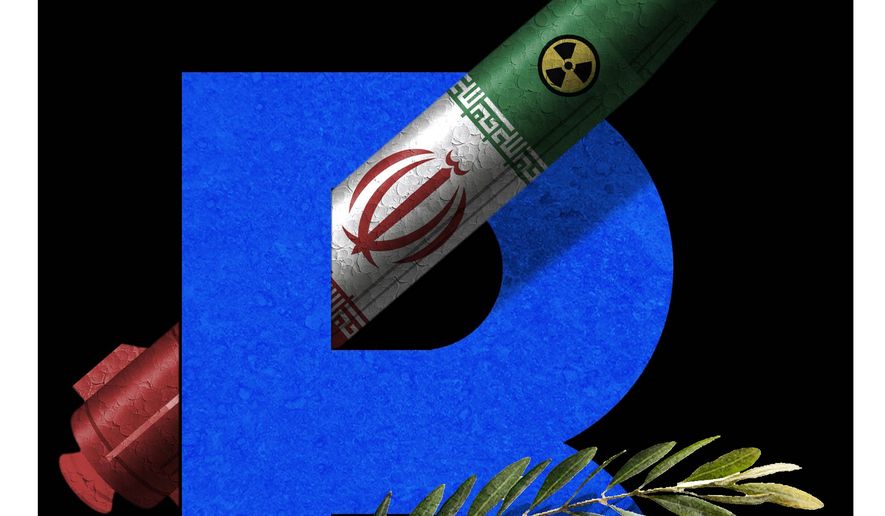OPINION:
A version of this story appeared in the daily Threat Status newsletter from The Washington Times. Click here to receive Threat Status delivered directly to your inbox each weekday.
During his 2020 campaign and since, President Biden has been obsessed with a renewal of former President Barack Obama’s 2015 nuclear weapons deal with Iran, the “Joint Cooperative Plan of Action.” Now, because of his weakness while trying to negotiate a new deal, some of his lead negotiators are quitting.
First among those who have quit Mr. Biden’s team is Richard Nephew, the deputy special envoy for Iran. According to a Jan. 24 Wall Street Journal report, Mr. Nephew had advocated a tougher approach to Iran. That report said that two other people have also quit the team.
Iran refuses to negotiate directly with the U.S., so representatives of the other signatories to the 2015 deal — Russia, China, Germany, France and the U.K. — meet with the Iranian delegation and Mr. Biden’s negotiators separately.
Iran hasn’t really budged an inch and Iran’s new President Ebrahim Raisi sent a new negotiating team in December which promptly reneged on the minor concessions made by Iran’s previous negotiators.
While the negotiations drag on, Iran is pushing as fast as it can to develop nuclear weapons. It has reportedly enriched uranium to the 60% level, thirty percent below weapons-grade, far above the level permitted by the JCPOA. New enrichment centrifuges continue to operate while Iran develops other key elements of nuclear weapons such as “triggers.”
Iran insists that all U.S. economic sanctions have to be lifted before Iran complies with another deal, which even Mr. Biden recognizes as too great an act of appeasement. But he is not above appeasing Iran in other ways.
Iran lost its vote in the U.N. General Assembly in 2020 because of its failure to pay about $18 million in UN dues.
In a startling act of appeasement, Mr. Biden apparently asked South Korea to pay Iran’s UN dues to restore its vote. On Jan. 23, the South Korean Foreign Ministry said it had paid Iran’s dues after consulting with the U.S. Treasury Department. Why is Iran’s vote in the UN so important to Mr. Biden that he would ask an ally to pay for it?
In addition to demanding that all U.S. sanctions be removed, Iran also demands a U.S. guarantee that it would not again cancel the 2015 deal as former president Trump did in 2018.
Mr. Biden cannot bind future presidents to any new deal unless it was submitted to the Senate for ratification as a treaty. Mr. Obama, knowing that he couldn’t get the 66 votes necessary for ratification, chose not to submit the JCPOA and its classified annexes to the senate. (One former senior Republican senator who was serving then told me that he had never seen the annexes.)
Instead, Mr. Obama submitted the JCPOA to the U.N. Security Council for approval, which was quickly given. Because Mr. Biden is far weaker politically than Mr. Obama was, he won’t give the Senate a chance to reject a new version of the JCPOA.
On Jan. 28, a statement issued by the State Department and negotiators from France, Britain and Germany said, “January has been the most intensive period of these talks to date. Everyone knows we are reaching the final stage, which requires political decisions.”
After 10 months of negotiations (including a five-month hiatus insisted on by Iran), the most difficult issues remain. Meanwhile, Iran has proceeded with its nuclear weapons development and reached the “breakout” point at which it could, within months or weeks, produce a nuclear weapon.
Thus, Mr. Biden has to face those tough political decisions. He can’t guarantee that a future president won’t revoke the agreement and he can’t agree to remove U.S. economic sanctions without a new agreement that would do everything the original JCPOA didn’t, such as guarantee unlimited open inspections of all of Iran’s nuclear development sites and limit its missile programs. Iran won’t agree to any new JCPOA unless Mr. Biden meets all of its demands because it is intent on developing nuclear weapons with or without a new deal.
In fact, Iran will never give up its nuclear weapon capabilities peacefully.
It’s entirely likely that Mr. Biden will let the negotiations drag on because he doesn’t want to face the alternative which is a crisis over Iran’s completion of its development of nuclear weapons. Neither does the U.K., Germany and France. At this point, continued negotiations with Iran are another means of appeasing it.
As this column has stated before, Mr. Biden should walk away from the negotiations and make it perfectly clear that Iran’s intransigence is to blame. But he won’t. He will appoint new negotiators to replace those who have quit in frustration with his weakness.
Mr. Biden should keep the pressure on Iran’s economy. Though our sanctions are regularly violated by China which purchases enormous amounts of Iranian oil — for which China should be sanctioned — they are still effective. Like many presidents before him, Mr. Biden has said Iran wouldn’t be permitted to obtain nuclear weapons but if he continues to appease Iran, it will soon have them.
In 1938, Winston Churchill scolded appeaser Neville Chamberlain, saying that Mr. Chamberlain chose dishonor over war and that war would be the result. Mr. Biden is making the same kind of mistake Mr. Chamberlain made. The result will be a very big war.
• Jed Babbin, a deputy undersecretary of Defense in the George H.W. Bush administration, is the author of “In the Words of Our Enemies.”




Please read our comment policy before commenting.